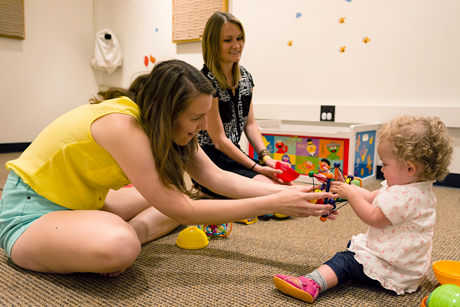Oh, B.A.B.Y.: Undergrads study language in kids
By Kathy Hovis

Does the busyness or crowding in a home affect a child’s ability to learn language? How do older children learn to structure their sentences, and how does this ability vary depending on environment and caregivers?
Questions like these are keeping students Chantal Hoff ’14 and Brenna McGuire ’14 busy in Ithaca this summer, as they prepare honors research projects as Pauline and Irving Tanner Dean’s Scholars in the College of Arts and Sciences.
Hoff and McGuire work in the Behavioral Analysis of Beginning Years (B.A.B.Y.) Lab at the Eleanor J. Gibson Laboratory of Developmental Psychology, where students use babies and songbirds to study social learning and the development of vocal communication.
Many students join the lab as freshmen and sophomores, and majors vary from psychology, biology, engineering and human development to English, history, linguistics and computer science, said Michael Goldstein, associate professor of psychology and director of the lab.Hoff, a linguistics major, researches the ways 5- and 6-year-olds learn irregular nouns. “I’ve always liked problem-solving and the critical thinking involved in research on language,” she said.
To define her project, Hoff did a vast amount of reading, focusing on researcher Adele Goldberg’s work on language learning. She is now finalizing the details of her study – what questions to ask, objects to use and tools she will develop to analyze the child’s home environment. She also is awaiting word from Cornell’s Institutional Review Board, which has to approve every project involving human subjects. Then she will begin recruiting families to participate in her study.
McGuire focuses on how crowding affects a toddler’s ability to learn new words. In her study, she will work with a child on a language-oriented task, but in some cases, others will be present in the room and milling around outside in predictable or unpredictable patterns.
McGuire, a psychology and history major, said she enjoys research with practical applications, like her study, which is based on the thesis that chaotic environments negatively affect cognitive development. Most previous research in this area has been correlational – looking at the cognitive development of infants in chaotic environments, such as one that examined why children living on lower levels of apartment buildings in urban areas scored lower on IQ and academic tests than those living on upper floors. McGuire’s study looks at different elements of chaos to better understand why chaotic environments negatively impact learning.
Tanner Dean’s Scholars receive $300 to buy books for classes, mentoring, monthly meetings with Cornell faculty members and workshops. They can also apply for summer research grants up to $2,500 between their junior and senior years, the awards that Hoff and McGuire are using this summer.
“Language learning has always been the most fascinating phenomenon of human language,” Hoff said. “Through my research, I hope to bring more attention to the applicability of developmental research in the field of linguistics.”
She is one of 10 undergraduates and two high school students who are conducting research in the B.A.B.Y. lab this summer, Goldstein said.
“Some of our student projects have become ‘multigenerational’ in that they get handed off from a graduating student to a younger one so that follow-up studies can be run. As a result, several of our undergraduates have been co-authors on publications and conference presentations,” he said. “The experience of being on the cutting edge of research has motivated several of our students to pursue Ph.D.s in psychology and other biomedical fields.”
Kathy Hovis is a writer for the College of Arts and Sciences.
Media Contact
Get Cornell news delivered right to your inbox.
Subscribe